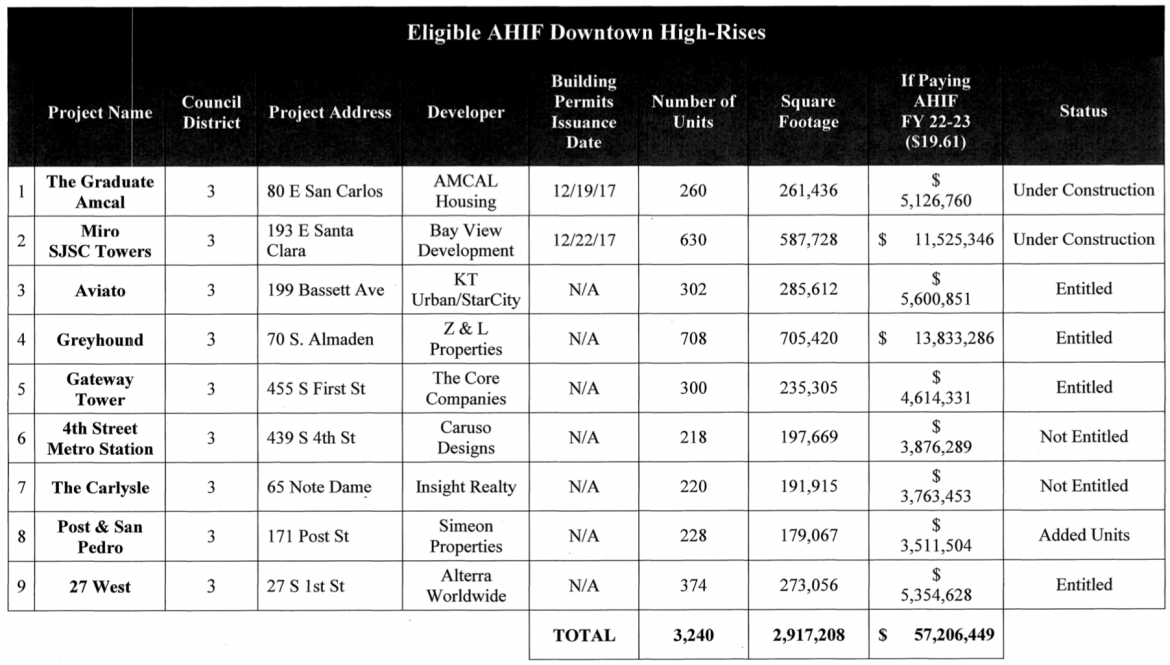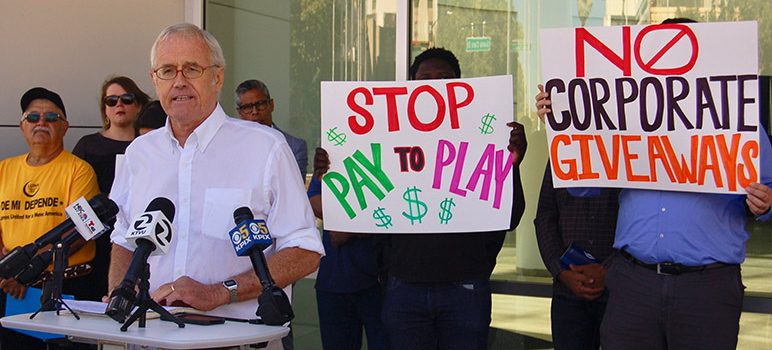Labor and business leaders squared off in dueling pressers Thursday over whether San Jose should extend a tax-break on high-rise development.
The incentive, which gives builders a 50-percent-off discount on construction taxes, dates back to the mid-aughts and was designed to spur new housing development in the hollowed-out heart of the 10th largest city in America.
Market-rate developers also get to skip a $17-a-square-foot affordable housing fee—if they met certain criteria, such as a stamp of approval by June 30, 2021, that the building is safe for people to live in. To date, projects that took advantage of the deal have added 1,522 homes to San Jose’s housing stock, according to the city.
As the City Council gears up for a vote next week on whether to re-authorize the subsidy for another few years, labor bosses are pushing back in a way that their business counterparts are calling a politically motivated attack.
Addressing reporters outside City Hall this morning, officials with Silicon Valley Rising—a union-coalition led by the South Bay Labor Council and Working Partnerships—slammed Mayor Sam Liccardo for backing a program that they say benefits his political patrons and cuts into tens of millions of dollars in revenue for affordable housing.
Nine projects are currently eligible for the subsidy and could add well over 3,000 units to the city’s housing stock, according to city estimates.

Nine developers stand to gain a combined $57 million in subsidies if the program gets re-upped for another few years.
“I think there’s going to be substantial resistance to the idea that $67 million in give aways does nothing but increase developer profits,” South Bay Labor’s Executive Director Ben Field told San Jose Inside.
Field’s coalition referenced campaign donations made by nine developers to Liccardo’s election campaigns or political causes he supported from 2016 to 2018, including a $450 million housing bond and a sales tax hike to fund transportation upgrades.
“It’s a terrible deal for the city’s taxpayers,” Field said about the subsidy. “And to make matters worse, these nine downtown luxury housing developers, they happen to be big contributors to candidates for city council and mayor in the city of San Jose.”
Sandy Perry, who leads the Affordable Housing Network, said the discount for new development comes at a human cost.
“Tens of thousands of people are being displaced from their homes and the city altogether,” he said. “What’s going on in City Council right now is that the mayor and some council members are completely tone deaf to this crisis because they’re relieving wealthy developers from their affordable housing requirements.”
Proponents of the fee exemption, on the other hand, say it’s needed to speed up housing production for all income levels. And they bristled at labor’s attempt to paint Liccardo as the ringleader of a policy historically backed by both labor and business interests.
To wit: an extension of the incentives program sailed through in December 2016 with ‘ayes’ on all sides. Liccardo, Vice Mayor Chappie Jones and council members Magdalena Carrasco, Sergio Jimenez, Johnny Khamis and Raul Peralez all voted for the tax break at the time. And going back to the early days of the policy, labor doyenne and then-Councilwoman Cindy Chavez teamed up with business-friendly Mayor Chuck Reed to back the subsidy in the years that led up to the Great Recession.
“We have reduced fees—with no direct city subsidy—to enable projects to get built downtown, but the reduction will soon expire,” Liccardo said. “The downtowns of other cities experiencing rising rents—such as Seattle, Dallas, Atlanta, and Austin—are seeing dozens of high-rise cranes in the air, but if [the] council doesn’t extend the existing fee reductions, San Jose will continue to suffer through its housing crisis with a puzzling dearth of high-rise construction.”
When reached for comment, an official for Peralez—whose council district stands to gain the most from the incentive, in terms of new construction—declined to comment.
At a news conference just a few blocks down and outside the Silicon Valley Organization (SVO) headquarters, the mayor's allies batted away labor’s criticism as trumped-up and intentionally misleading.
SVO President Matt Mahood decried the tactic as “politicizing” the issue. “In the past, labor groups have supported changes in the fee structure in order to bring construction jobs into the city of San Jose,” he said. “Both union and non-union projects.”
The reason for the politicking, Mahood went on to say, is that South Bay Labor wants to drum up support for its Fair Election Initiative—a ballot measure that would exempt certain developers and their lobbyists from donating to campaigns for city office.
Scott Knies, head of the San Jose Downtown Association, said he was bothered by Silicon Valley Rising’s insinuation that downtown isn’t doing enough for affordable housing. He cited several projects—including the recently opened Second Street Studios, which house formerly homeless people, and the proposed dormitory-style Starcity development—that materially undermine that claim.
“You look at some of the projects on the list that need this fee reduction and they’re new product types like co-living, which are being pioneered in downtown for the first time,” he said of the “dorms for adults” concept. “This is where you can build denser. This is where you can take advantage of transportation.”
Field objected to the idea that the coalition’s specific focus on the mayor is political. “The mayor’s been leading the charge to subsidize these projects,” Field insisted.
But as the mayor pointed out in a statement earlier today about Chavez's involvement, he’s hardly been the only one “leading the charge,” to quote Field.
A November 2016 memo shows that Peralez, who represents downtown, teamed up with Liccardo to promote the fee waiver. During his re-election bid last year, Peralez was widely endorsed by labor, business and developers—including some of the same developers that Silicon Valley Rising accuses Liccardo of “padding their profits.”
“We must also recognize what this proposal is not: it is not a ‘giveaway’ of public money,” Liccardo and Peralez wrote in their 2016 memo. “To the contrary, for those several projects which remain stalled for lack of financing, this can result in a net fiscal gain to the taxpayer, if future revenues are properly discounted over time.”
“Why?” the duo added. “A project that does not get built will not generate any fee revenue; regardless of the fee rate, 100 percent of zero is zero.”
The San Jose City Council meets at 1:30pm Tuesday at City Hall, 200 E. Santa Clara St. Click here to read the agenda.


I know ,
Lets do something environmental correct, stop all new construction, finish what already been started and then no more.
No more pay offs, no more permits, no more affordable or unaffordable housing. No more GOOGLE’s, no more airport’s, no more roads, no more light rail.
San Jose will pass Baltimore and become the next Mogadishu.
No one is asking how much wealth these developers have and if they can afford to develop without fee waivers. My neighborhood and downtown has seen an increase in housing development but unfortunately we have no parks, no traffic calming measures, way too much blight, increase in homeless encampments and crime. Our police force and other city services cannot handle these new housing developments. If you look at NextDoor, especially in the areas around downtown people are overwhelmed with the homeless and crime. The city’s Parks Department recently did a study and my neighborhood was tagged as being in the RED ZONE. Well they did not have to pay for a study because this has been the case for years. The city keeps waiving fees knowing money is needed to beautify and lift the quality of life for its residents downtown. I am deeply disappoint in Council member Raul because my hopes were as a former police officer he would have a better understanding of the problems downtown and the needs of the residents. A common complaint I am hearing on NextDoor is nothing changes. Someone told me once that politicians always go around asking what do you want and then they get elected and do what they want.
> No one is asking how much wealth these developers have and if they can afford to develop without fee waivers.
No one is asking it because we are a constitutional republic and everyone is entitled to equal protection under the law no matter how much wealth you have.
How much wealth a person has is none of the government’s business except in communist tyrannies.
> We need that old San Jose color back.
> I don’t want to see just fast and expensive cars with preppy sweater wearing drivers.
> Sounds simplistic . . .
Sounds dumb.
Sandy Perry and I differ on most things until now. I am of the “give em a Hand up” camp and well, Sandy is more along the lines of a “Hand out camp”. HOWEVER, this time Sandy is 100 percent right on and I totally agree that we need to have the big time developers that are changing our skyline help out with affordable housing as well. It makes all of the sense in the world to have people live where they work and play. The downtown core and Google Village will become more gentrified and less for the folks who service our community. We need that old San Jose color back. I don’t want to see just fast and expensive cars with preppy sweater wearing drivers. I want the guy raising his family and putting his kids through school to be able to live downtown as well. Let’s help out the young family as well as the guy working two jobs to keep a roof over his head. Let’s help out the guy who wants to both live and work downtown. Labor needs business for a job, but more than that business needs labor to run that business. Let’s stop having our workers driving three hours a day just to get to work downtown when they only need walk a few blocks. Help the people and you in turn help the planet. Sounds simplistic but I truly believe that it takes all of us to make this world work. Let’s bring everyone along on this ride we call life and in turn be all the richer for it.
Dear Grace: how on earth is reducing a fee (which is an incremental, above market cost) considered a subsidy (which is a below market cost)?